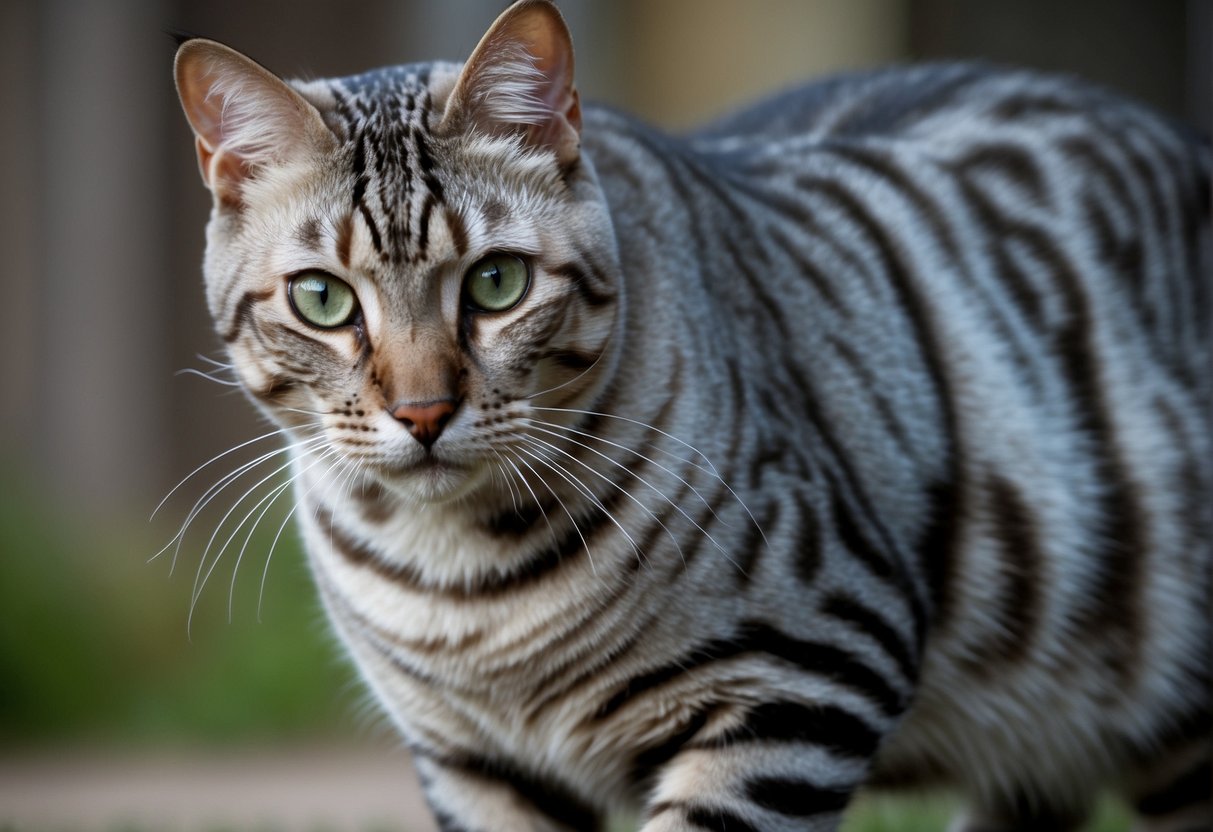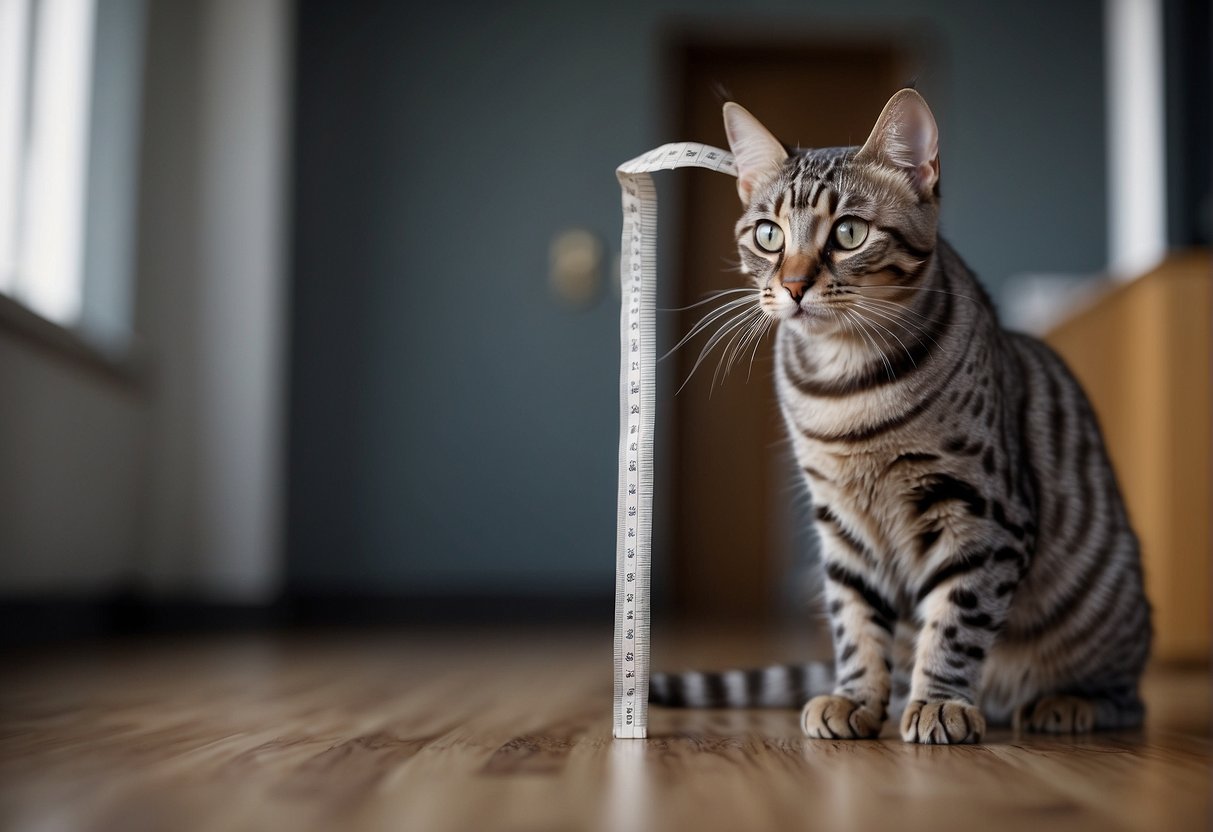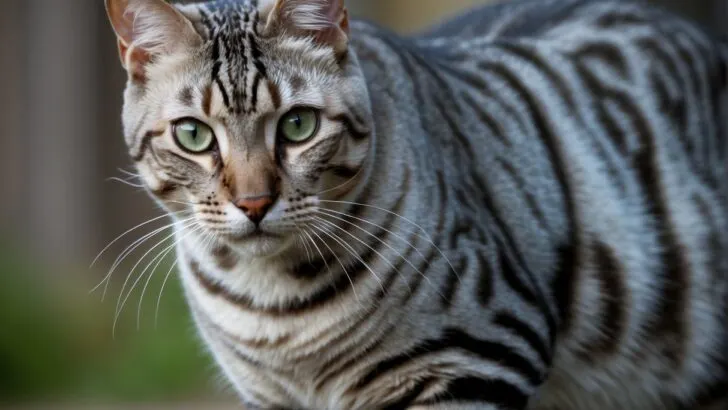Silver Bengal cats, a striking variety of the Bengal breed with a glamorous silvery coat, typically reach a substantial size. They can grow to weigh anywhere between 8 to 17 pounds and may stand 13 to 16 inches tall, showcasing a delightful combination of both muscle and grace.

The Size Range of Silver Bengal Cats
When you’re considering adding a Silver Bengal cat to your family, it’s important to understand that these felines can vary quite a bit in size. Their muscular bodies and distinct genetics contribute to their impressive stature, which is larger than many other housecat breeds.
Typical Weight Benchmarks for Silver Bengal Cats
Male Silver Bengals:
- Average Weight: 10-15 pounds
- Notable Range: Some can weigh up to 22 pounds
Female Silver Bengals:
- Average Weight: 6-10 pounds
Growth Timeline:
- Kittens between 2-3 months typically weigh around 2-3 pounds
- By 6 months, they can weigh 6-8 pounds
- Adult size is usually reached by 1.5-2 years
These weight benchmarks give you a realistic expectation for how large your Silver Bengal might get. Each cat is unique, so there’s room for variation within these ranges.

Factors Influencing the Growth of Silver Bengals
Genetics: The genetics of Silver Bengals are influential, especially the inhibitor gene that gives them their stunning silver coat. Their size owes a lot to their hybrid origins – the domestic cats they descend from, and the wild Asian Leopard Cat genes they inherit.
Diet & Health: Proper nutrition and care are crucial. A healthy diet and regular veterinary check-ups ensure that your Silver Bengal stays within a healthy size range.
Environment: An active lifestyle will help develop strong, muscular bodies. Encouraging play and providing space to explore are key for their physical development.
Monitoring and Managing Your Silver Bengal’s Weight
Keeping your Silver Bengal at a healthy weight is crucial for its overall well-being. Both diet and exercise play significant roles in ensuring your feline friend stays energetic yet not prone to obesity.
The Impact of Diet on Silver Bengal Size and Health
Your Silver Bengal’s health is directly linked to what you feed them. A diet rich in high-quality protein is vital, as it mimics the nutrition they would receive in the wild.
- Proper Feeding: Stick to a feeding schedule, typically twice a day, which helps prevent overeating. Measure their food to avoid giving too much.
- Food Quality: Look for foods that list real meat as the first ingredient. Avoid cheap food with fillers as those only worsen the problem.
- Avoiding Obesity: Since Silver Bengals can be prone to obesity, steer clear of a high-carb diet and monitor treats.
Exercise Essentials for Maintaining Silver Bengal Cat Size
Silver Bengals are naturally energetic and playful, which makes incorporating exercise into their daily routine both essential and enjoyable.
- Interactive Play: Engage in play that mimics hunting behaviors. Toys like feather wands or laser pointers can stimulate those instincts.
- Climbing Opportunities: Install cat trees or shelves for climbing. Silver Bengals love heights and will use these to burn off energy.
Aim for balancing a nutritious diet with fun, daily activities, you can help maintain your Silver Bengal’s healthy weight and vibrant energy.
Health and Wellness
When it comes to your Silver Bengal cat’s health and well-being, maintaining a proper weight and being aware of potential health issues are crucial for a long, vibrant life.
Recognizing and Preventing Obesity
Obesity is a significant health concern for Silver Bengal cats. It’s important for you to recognize early signs of weight gain in your Bengal because extra pounds may lead to health problems like diabetes and heart disease. To prevent obesity:
- Measure Meals: Use a measuring cup to serve food to make sure you’re not overfeeding.
- Daily Exercise: Engage your Bengal in active play that simulates hunting behaviors.
- Regular Check-ups: A vet can help monitor your cat’s weight and offer advice.
Health Risks Associated with Oversized Silver Bengal Cats
An oversized Silver Bengal cat is prone to various health issues. It’s essential to understand the risks to afford your cat the best care. Specific health risks include:
- Joint Problems: Excess weight can cause strain on your Bengal’s joints.
- Diabetes: Just like in humans, overweight cats face a higher risk of developing diabetes.
- Heart Disease: The extra fat can lead to increased cholesterol and heart issues.

My name is James, and welcome to FAQCats!
Along with our team of cat owners, expert pet enthusiasts, and pet professionals, we aim to write engaging helpful, engaging content about cats. At FAQCats we strive to provide content that’s accurate and fun to read. Our team writes about everything related to cats; even the most complex of topics. Through extensive research and caring for our own fur-pals, we’re able to provide something cat owners worldwide will love. Have a look around, and leave us feedback anytime!

